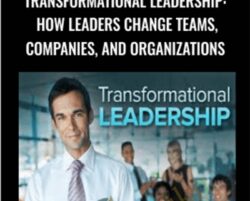Contrary to what you may have heard, great leaders aren’t born. They’re made. The ability to effectively lead teams, transform entire organizations, and achieve ambitious goals comes not from an inherent set of personality traits but from the mastery of a specific set of skills essential to the success of leaders at many levels and in many fields.Chief among the specific skills of transformational leadership areestablishing a compelling vision,persuading and influencing others who may not agree with you,motivating people who may be wary of changes in the status quo,building an effective team that can manage and institutionalize change, andsparking innovative thinking.Possessing these and other leadership abilities are powerful tools; so powerful, in fact, that when used correctly they can turn winless teams into renowned champions, unmotivated departments into engines of creativity, and money losers into market leaders. What’s more, these are skills that can be learned, practiced, cultivated, and applied to almost any aspect of your professional life—whether you’re currently working in a leadership position, preparing to take on a more prominent role in your career, or looking to understand the secret knowledge of how great leaders do what they do.Transformational Leadership: How Leaders Change Teams, Companies, and Organizations is your essential handbook for strategies, concepts, and insights into the dynamics of transformational leadership. Delivered by award-winning Professor Michael A. Roberto of Bryant University—a Harvard Business School–educated instructor who has spent years as a leadership consultant and teacher for Fortune 500 companies, including Apple, Target, and Federal Express—these 24 lectures are an in-depth examination of the leadership behaviors and capabilities essential to creating positive change in teams and organizations. Filled with case studies and lessons from leaders in business, politics, sports, and the military, as well as a range of specific skills and strategies you can put to use in your own career, this course is an authoritative guide to successful leadership.Discover the Four Key Modules of Great LeadershipUnlike management, which focuses on achieving consistent and reliable results, transformational leadership focuses on producing change—sometimes very substantial or even radical change. In Transformational Leadership, Professor Roberto defines effective leadership as consisting of three fundamental processes.Establishing direction: Great leaders not only cultivate attractive and profitable visions for the future of teams, companies, and organizations, they develop solid strategies for achieving goals and results.Aligning people: Great leaders have the ability to bring different groups together for a shared purpose by communicating the direction, building a shared sense of understanding, getting people to believe in their vision, and persuading people to enact key strategies.Motivating and inspiring others: Great leaders surmount potential roadblocks on the path to change by energizing people and satisfying their core needs, including achievement, belonging, recognition, self-esteem, and a desire for control over their lives.After an introductory lecture on the definitions of effective, transformational leadership, you dive right into the nuts and bolts of this important professional skill. In order to make the subject well organized and easily accessible, Professor Roberto has arranged Transformational Leadership into four key modules, each of which offers a focused look at a particular aspect of leadership.Models of Leadership: The study of leadership has evolved throughout the years, with several prominent schools of thought providing contrasting perspectives on how to approach and understand the subject. Here, you’ll survey the major models of leadership and learn how they address critical issues such as human behavior, power and influence, long-term goals, and charisma.The Change Process: Prompting change at the group or organizational level is rarely easy, but that doesn’t mean it can’t be mastered. This second module focuses on understanding and avoiding resistance to change, working with the rational and emotional sides of those people under your charge, and finding ways to solidify and institutionalize change into the culture of a group or organization.Critical Skills and Capabilities: Becoming a stronger leader requires a mastery of several essential skills that have the power to turn good leaders into great leaders. Some of the major skills and capabilities you examine in this module include motivation, power, persuasion, negotiation, and teamwork—and for each of them, you’ll get a host of tips and techniques to apply to your own leadership style.Creativity, Innovation, and Learning: For leaders to have a lasting impact, they need to tap into the strengths of creative thinking, dynamic innovation, and organizational learning. This last module is devoted to these three dimensions of transformational leadership, and it’s filled with a wealth of information on everything from after-action reviews and systems thinking, to group flow and open innovation, to mentoring and leadership development.Professor Roberto closes out the course with a final stirring lecture that serves as a call to responsible leadership. It’s a vibrant lecture that is as informative as it is inspiring.Discover the Transformational Leader’s Tool KitCentral to Transformational Leadership are the skills, techniques, concepts, and strategies you can put to use in your own role as a leader or in other aspects of your professional career. While Professor Roberto roots each lecture in the ideas that form the backbone of leadership studies, he takes care to make these ideas relevant and accessible to any number of situations. The result is a veritable tool kit that anyone can use to strengthen his or her leadership style.Here are just four of the many skills you’ll learn with the help of Professor Roberto.How to best frame organizational change: How you “frame” a change can matter a great deal with regard to whether it’s resisted. Labeling a strategic issue as a threat, instead of an opportunity, tends to decrease the amount of involvement and participation of lower-level members in a team or organization.How to cultivate allies: Cultivating allies is a way to create and accumulate resources that can be valuable for years. First, you need to recognize who these individuals are. Then, you can develop alliances by making promotions and appointments, providing resources, doing favors, sharing credit, and making others feel important.How to make change stick: Abstraction is the enemy of any change effort, so to make change last, transformational leaders have to make the concept real for people. This can be done by emphasizing specifics, tapping into people’s emotions, and using personal stories.How to shape your negotiating environment: When negotiating with others, shape your environment by setting specific ground rules, breaking up the process to focus on “low-hanging fruit” first, and always getting others to see the value of building a long-term professional relationship.Learn from a Professor with Real-World ExperienceEducated at Harvard Business School, Professor Roberto is a masterful lecturer, one whose career in leadership studies and education has earned him a host of awards, including the Allyn A. Young Prize for Teaching in Economics from Harvard University and five Outstanding M.B.A. Teaching Awards from Bryant University. These merits, combined with his decades of real-world experience delivering these same insights about leadership in the boardrooms of some of the world’s most prestigious companies and organizations, make him the perfect instructor for a Great Course on leadership.With Transformational Leadership, you’ll approach this fascinating subject from an engaging, authoritative, and inspiring perspective and finally tap into the secrets of effective leadership. This series of lectures is sure to have an invaluable impact on the future of your team or organization—as well as on your own career.24 lectures | Average 31 minutes each1 The Challenge2 Portrait of a Transformation3 Do Great Leaders Share the Same Traits?4 How Much Does Context Matter?5 Charismatic and Transformational Leadership6 Resistance and Reactions to Change7 Phases of Transformation8 Harnessing Emotion9 Making Change Stick10 Extrinsic Motivation and Reward11 Beyond Money—Intrinsic Motivation12 Power—Getting It and Keeping It13 Key Levers of Power14 Influence—Tools of Persuasion15 Give and Take16 Negotiating as a Way of Life17 Avoiding the Zero-Sum Game18 Building and Leading Teams19 Guiding Teams as They Evolve20 Observation and Organizational Learning21 Deliberate Practice and Experiment22 Stimulating Creativity23 Leading Innovation24 Developing LeadersGet Transformational Leadership: How Leaders Change Teams, Companies, and Organizations – Michael A. Roberto , Only Price $52Tag: Transformational Leadership: How Leaders Change Teams, Companies, and Organizations – Michael A. Roberto Review. Transformational Leadership: How Leaders Change Teams, Companies, and Organizations – Michael A. Roberto download. Transformational Leadership: How Leaders Change Teams, Companies, and Organizations – Michael A. Roberto discount.
Transformational Leadership: How Leaders Change Teams, Companies, and Organizations – Michael A. Roberto
₹7,968.00







